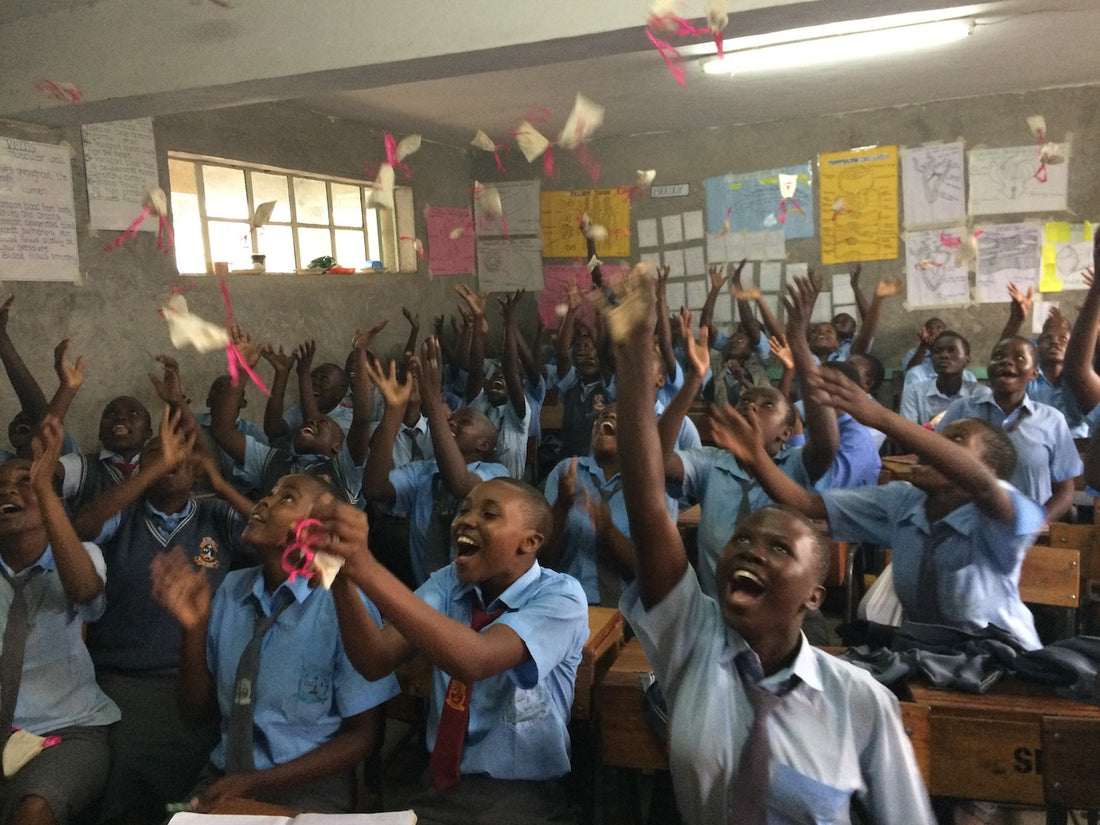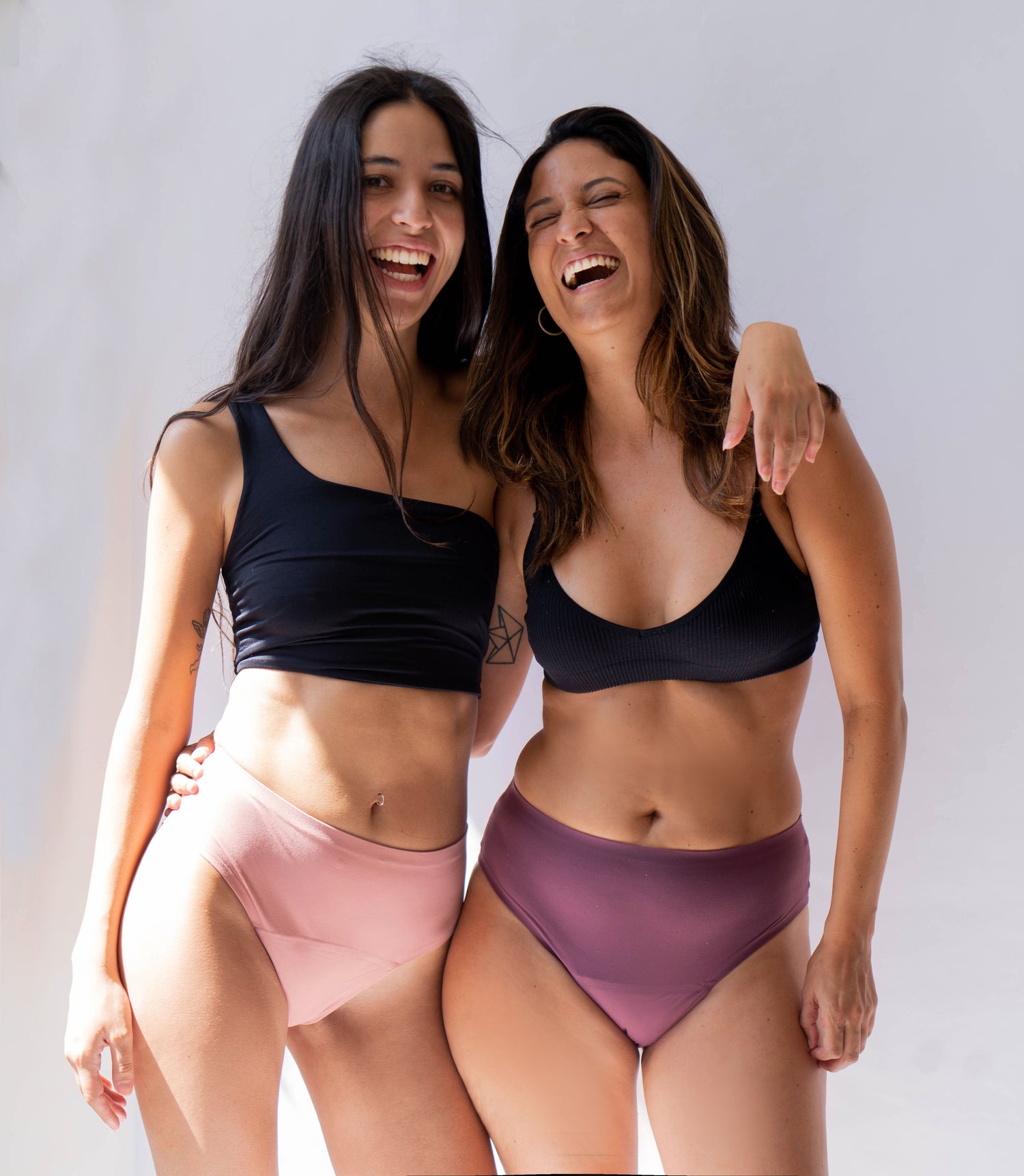Follow Golda Ayodo from Golden Girls Foundation to see how the Ruby Cup you donated reaches the hands of girls in need.
A thunderstorm is brewing up on this humid afternoon in Kisumu, rural Kenya. It is 3:30 pm as we drive through the gates of St. Peter’s Nanga Secondary School. Today, I am shadowing Golda Ayodo as she distributes Ruby Cups to a group of school girls and trains them how to use them.

The school has around 300 students in total. Out of these, about 90 girls from two grades are currently crammed into one class room. All the boys have been sent out – this is a ‘girls only’ affair. The room is filled with giggles, wide eyes, dangling legs.

Golda introduces herself as the founder and director of the Golden Girls Foundation. She breaks the ice by asking the girls some questions and joking around with them. After a few minutes, she gets to the point:
“What do you use for your periods?” She browses the room for raised hands.
“Yes?”
“We use sanitary towels.”
“OK, but not we, you! Be honest, what else do you use?”

One by one, more hands go up, more answers come tumbling out: Cloth, tissues, blankets, mattress filling, cotton… Golda switches between English and Kiswahili as she learns more about the pupils and their period habits.
“The reason why our periods are so messy is because they leak out, and that is because of the materials we use”, the Golden Girls director says. Now, what material is Ruby Cup made from? “It’s not rubber, even though it looks like it. It’s called medical grade silicone.”

A questionnaire is handed out for the girls to fill in. It asks questions about which menstrual health products they currently use and how satisfied they are with them, among other things. The girls are also asked to provide their contact info, which will be used to follow up with them on how they are using their Ruby Cup a few months later.
Golda is aware of the girls’ living realities: “Some of you have mobile phones, true? You write your number. If you don’t have your own mobile phone, that is not a crime, just write your mum’s or your teacher’s.”
When everyone is done scribbling, she takes a little beige and pink pouch out of a gym bag. “Have you seen the cup?” A few nods in a room full of shaking heads. “Do you want to see it?” “Yesss!” “Ta-daaa!” Golda pulls the transparent cup out of the pouch and holds it up victoriously.

She demonstrates vividly how to crouch down to insert the cup. The girls are cheering her on, the room is boiling. She explains how to remove the cup without making a mess, swiftly executing the necessary movements. “After that, you can rinse it with clean water, or just wipe it with tissue paper, if you don’t have safe water around. After your period has ended, you just disinfect it by boiling it in water for five minutes.”
Golda makes the girls aware that they will have to take good care of their new Ruby Cups: They are not only popular with human beings. “Rats love it, so store it away safely!”
“Now, who wants to try it? Only the ones who feel comfortable using it. We only want to make you aware of this option; we don’t want to force you to use it.” The girls line up to receive their Ruby Cups. They unpack them eagerly at their desks, squeezing and pulling them, studying the paper guides that come with the cup.

Now it’s time for one more round of questions. “Ask away!”, Golda encourages the girls.
“Does it hurt?” “That depends on your technique.”
“Does it make the vagina bigger?” “When a baby comes out of your vagina, it doesn’t stay wide open, does it? Your vagina is elastic, and it will still be beautiful.”
“How do you know you put it in the right hole?” “… You’ll know. Don’t worry.”
“Can I still pee with it?” “Yes, you can pee with the cup.”
“Do you use warm water or cold water to rinse it?” “Cold water is enough.”
When all of the girls’ questions are answered, we say our good-byes and leave the classroom. The rain has come and gone while we were in there. As we exit the school’s compound, I turn around to see what we’re leaving behind: muddy puddles and a bunch of happy, chatty girls.
_____________________________
Ruth Asan is a writer and political communication consultant from Germany. She has worked and studied in Berlin, Spain and Kenya. Most recently, she became co-founder of the Savara Women’s Advancement Program (SaWA), a training and mentorship program for young women from Nairobi.
 Your Account
Iniciar sesión
Your Account
Iniciar sesión
 Basket
Basket



